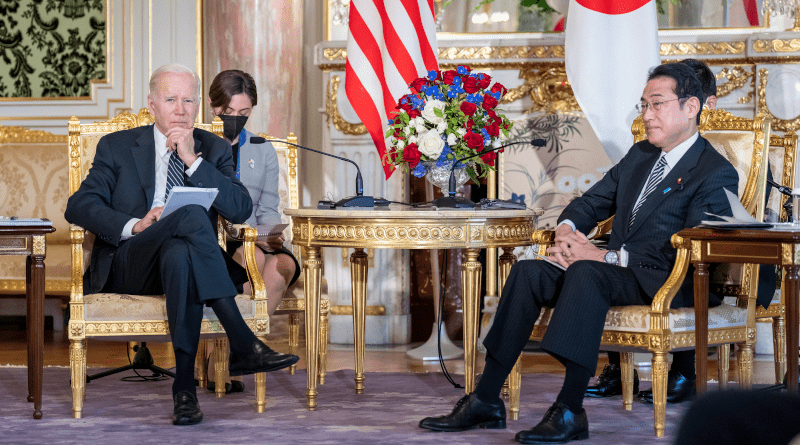Japan–US Relations After Russia’s War In Ukraine – Analysis
By Fumiaki Kubo*
While Russia’s invasion of Ukraine shocked Japan, its seriousness was multiplied by China’s support for Russia. Facing this new reality, Japan’s national security policy is now undergoing a historic change at an unprecedentedly fast pace.
Many countries expand their military strength as they acquire wealth. However, there are at least two important exceptions, the most important of which was the United States in the 19th and early 20th centuries. It was only after the start of the Cold War that the United States became a standing military superpower.
The second case is post-war Japan. As it rose as an economic powerhouse, Japan’s defence policy was characterised by self-restraint. It’s surprising that Japan, despite being surrounded by states like China, Russia and North Korea, has kept its defence spending below one per cent of its GDP for many years. The Liberal Democratic Party (LDP) responded quickly to the Ukraine crisis. On 27 April 2022, the LDP’s Research Commission on National Security presented Prime Minister Fumio Kishida with recommendations to strengthen Japan’s defence capabilities. These included obtaining ‘counterstrike capabilities’ and aiming for a defence budget equivalent to two per cent of GDP in five years. In the July 2022 Upper House election, the governing coalition was handed a solid victory, which suggests that Kishida will enjoy a three-year-long ‘golden period of legislation’, uninterrupted by a national election. A substantial part of the defence capability recommendations are now being adopted by the government. It is evident that their smooth acceptance was influenced by the Russia–Ukraine war.
While the one per cent defence spending practice garnered widespread domestic support, it has been criticised internationally. Liberal and leftist intellectuals in Japan, the United States, China and South Korea have consistently criticised Japan’s ‘remilitarisation’ and ‘hyper-nationalism’ since 2012, when Shinzo Abe returned to the prime ministership and tried to shore up Japan’s defence capabilities. On the other hand, many national security specialists in the United States have complained that Japan’s defence policy has been too cautious.
While the Barack Obama administration complained that Japan was not tough enough with Russia when they seized Crimea, the Abe administration felt that the US approach to China was also weak.
During the Donald Trump–Shinzo Abe period, bilateral relations looked cordial on the surface because of the good personal chemistry between both leaders. Japan welcomed the Trump administration’s confrontational policy towards China, though some were concerned about Trump’s understanding of the Japan–US alliance. Trump was reported to have said that the United States should terminate the ‘unfair’ alliance with Japan because Japan was not obligated to defend the United States although the United States was obligated to defend Japan. The Trump administration withdrew from the Trans-Pacific Partnership despite pleas from Japan. And although the Trump administration supported the vision of a Free and Open Indo-Pacific (FOIP), Trump rarely mentioned it.
After President Joe Biden’s election, Japan and the United States cemented positions on many major international issues, with relations based on mutual trust. Despite Japan’s fears, Biden maintained most of Trump’s tough policies on China. Biden’s approach to China is more methodical and predictable and less unilateral than Trump’s. Both countries are pursuing a values-based multi-country approach as they promote the FOIP vision, strengthen the Quad and cooperate at the G7 Summit Meeting.
For the United States, Japan’s intention to increase defence expenditure and examine counterstrike capabilities are encouraging measures that strengthen alliance capability. Japan’s tough attitude towards Russia and assistance to Ukraine is also appreciated.
The 2015 Peace and Security Legislation was a ground-breaking upgrade to the Japan–US alliance. Under this legislation, Japan was allowed to fight alongside the United States under certain conditions. Although this law was controversial in Japan and internationally, it would have been impossible for Japan and the United States to jointly and effectively prepare for a contingency in the Korean Peninsula or the East China Sea without it. FOIP and the Quad also originated under Abe’s leadership in 2006–07 and 2012–2020. On 20 July 2022, the US Senate adopted a resolution honouring the late Abe for laying a ‘lasting foundation’ for the US–Japan partnership.
Kishida has been in office for less than a year. The personal chemistry he has with Biden is still developing. But Kishida has already made a few meaningful decisions that deepen the alliance. Abe was underestimated and underrated. Many commentators got him wrong. Many of them probably got Japan wrong. This is why it is so important to watch Kishida’s performance in the domain of national security without any preconditioned bias.
*About the author: Fumiaki Kubo is President of the National Defense Academy of Japan and Emeritus Professor at the University of Tokyo.
Source: This article was published by East Asia Forum

